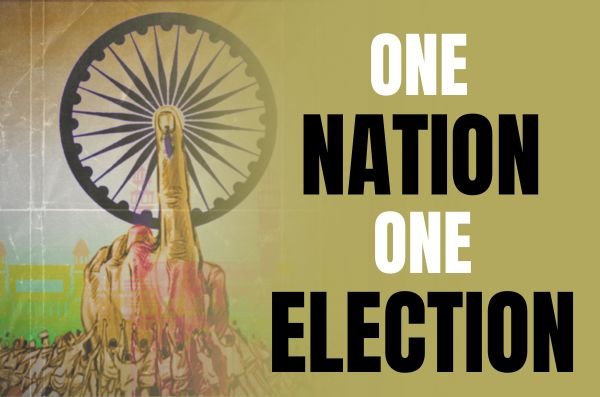
Recently the government of India approved the proposal of simultaneous elections for the Lok Sabha, State Legislative Assemblies and Local Government bodies. These simultaneous elections are popularly known as ‘One Nation One Election.’
Let’s understand this topic in detail.
After the Independence, first time simultaneous elections were conducted in 1951. And the same practice continued from 1951 to 1967. That practice of simultaneous elections ended with premature dissolution of some of the state governments in 1968 and 1969 and the early termination of the Lok Sabha in 1970.
What is ‘One Nation One Election’?
‘One Nation One Election’ is a process of conducting the simultaneous elections for the Lok Sabha, All the State Legislative Assemblies and Local government bodies (municipalities and panchayats) together in all over the India.
A high-level committee was constituted under the chairmanship of former President Ram Nath Kovind in sept 2023 to suggest the reforms on elections.
Accordingly, the panel reviewed international practices, consulted 39 political parties, experts, economists and the election commission of India and suggested progressive steps in that direction.
What are the Recommendations of the Committee?
- The committee recommended amendments to the constitution to enable simultaneous elections in two steps. First: Simultaneous elections will be held for the house of the people and the state legislative assemblies. For that, no ratification by the states will be required for the constitutional amendment. Second: Elections to the municipalities and the panchayats will be held within 100 days of holding elections to the Lok Sabha and the State Legislative Assemblies. This will require ratification by not less than one-half of the States.
- For This elections single electoral roll and electoral photo identity cards (EPIC) to be prepared by the Election Commission of India with the consultation of State Election Commissions. These amendments will require ratification by not less than one-half of the States.
- In case of hung house, no confidence motion or any such event, fresh elections should be held to constitute the new House of the People or State Legislative Assembly for the unexpired term of the House of People.
Considering all the factors, the government took that remarkable decision in the direction of strengthening the democracy of India. That decision has been taken on the basis of recommendation of High-level Committee on One Nation One Election.
An implementation group will be formed to take forward the recommendations of this committee. That group will execute the recommendations in this report.
The simultaneous elections will be conducted in two phases; In the first phase, elections will be conducted for the Lok Sabha and State Legislative Assemblies and in the second phase, the elections will be conducted for local government bodies which will be held within 100 days of general election.
Why there is a need to Have these Reforms?
- Frequent elections burden the government exchequer with additional expenditure
- Asynchronous elections cause uncertainty and instability
- Disruption of government machinery that causes hardship to citizens
- Frequent use of government officials and security forces adversely affect discharge of their duties
- Frequent imposition of Model Code of Conduct causes policy paralysis and slow down of developments
What are the Advantages of the ‘One Nation One Election’?
- Simultaneous elections would ensure ease and convenience to the voters and facilitate greater voter turnout
- It would promote stability and higher economic growth as it would remove the fear of adverse policy changes
- It would reduce the financial burden of expenditure for conducting elections
- It would ensure effective good governance and unhindered delivery of public services to citizens
- It would reduce election related offences and disputes
However, the opposition is criticizing the decision of the government, saying it is threat to Indian democracy and Indian Federalism. That can hinder the democratic election process and the electoral institutions in India
What are the Disadvantages of the ‘One Nation One Election’?
- India’s federal structure has given a set of powers to the center and the state. The simultaneous election can erode the significance of state governments.
- The regional issues would get overshadowed by national issues that would result in confusion among the voters.
- Synchronization of elections will be difficult, especially in case governments lose confidence in their assemblies.
Therefore, there is a need to establish consensus among stakeholders including various political groups, activists, experts, institutions and other groups. And that can be achieved through deep discussions, active participations, meetings and awareness generation programs.
